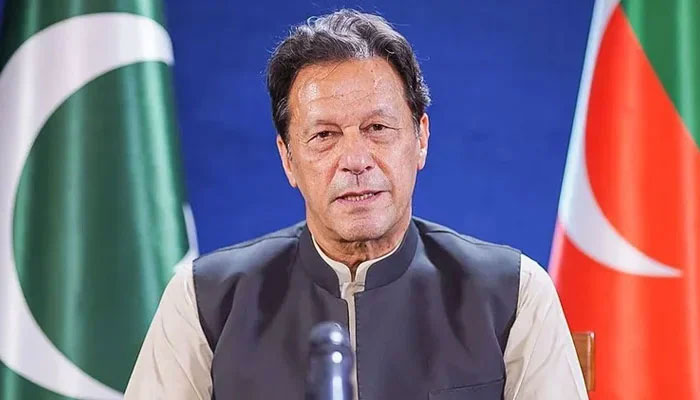ECP asks police to arrest Imran in contempt case
PTI chief’s counsel confirms that Imran Khan will appear before a four-member ECP bench tomorrow
ISLAMABAD: The Election Commission of Pakistan (ECP) Monday issued a non-bailable arrest warrant for Pakistan Tehreek-e-Insaf (PTI) Chairman Imran Khan, directing the Islamabad Police chief to arrest and produce him before the bench at 10am on Tuesday (today) in a contempt case.
However, in the Balochistan lawyer murder case, the Supreme Court (SC) restrained the police from arresting Imran Khan until August 9.
In the contempt case, a four-member ECP bench, headed by a member Nisar Durrani, had ordered for issuance of warrants for Imran’s arrest on July 11, following his failure to appear before the commission.
The proceedings against him and two other senior party leaders at that time — Asad Umar and Fawad Chaudhry — were initiated in August last year after they allegedly resorted to use of intemperate and contemptuous language against the commission and the chief election commissioner.
They were asked to either personally appear before the commission bench to clear their position or through their counsel. Instead of appearing before the bench, they had challenged the commission’s jurisdiction on the grounds that Section 10 of the Elections Act 2017, which is a statutory provision regarding the commission’s power to punish for contempt, is against the Constitution.
The Section 10 of Act 2017, titled ‘Power to punish for contempt’ states that the “Election Commission may exercise the same power as the high court to punish any person for contempt of court and the Contempt of Court Ordinance, 2003 (V of 2003), or any other law pertaining to contempt of court shall have effect accordingly”.
The Supreme Court of Pakistan, in January this year, had given a go-ahead to the commission to continue proceedings against Imran, Fawad and Asad Umar, whereas the commission on June 21, had decided to frame charges against the three.
The commission had summoned them on July 11 for a hearing, but none of them turned up, following which the ECP had issued arrest warrants for Fawad and Imran, while accepting a plea by Asad Umar’s lawyer to allow him an exemption from the hearing.
Meanwhile, the SC restrained the police from arresting PTI chairman until August 9, in the murder case of a Quetta-based lawyer Abdul Razzak Shar.
A three-member SC bench, headed by Justice Yahya Afridi, and comprising Justice Mazahir Ali Akbar Naqvi and Justice Musarat Hilali, heard an appeal of Imran Khan against the Balochistan High Court verdict, dismissing his plea seeking quashing of the first information report (FIR), nominating him in the murder of lawyer.
In pursuance of the court’s last order, issued on July 20, the former premier appeared before the court in-person along with his counsel, Sardar Latif Khosa.
The court also rejected the Balochistan government’s plea seeking Khan’s appearance before the Joint Investigation Team (JIT) probing the murder of the lawyer and adjourned the hearing until August 9.
The court, however, directed the PTI chairman to ensure his appearance before it on the next date of hearing.
Advocate Shar was killed on June 6 by unidentified people on three motorcycles while he was on his way to the Balochistan High Court (BHC). The deceased had previously filed a petition in the BHC seeking its direction for registration of a treason case under Article 6 of the Constitution against Imran Khan for dissolving the National Assembly.
On Monday, during the course of hearing, Prosecutor Balochistan and Sardar Latif Khosa, counsel for PTI Chairman Imran Khan, appeared before the court.
The prosecutor pleaded with the court to issue directives to Khan to appear before the JIT, probing the slain advocate case. Justice Yahya, however, rejected the plea with the ruling that they could not issue such an order at this stage. Similarly, the court also rejected the plea of PTI chairman seeking long adjournment in the case. The court observed that two-week time was sufficient in the matter.
Justice Mazahir Ali Akbar Naqvi asked the prosecutor on which basis he wanted to include the petitioner (Imran Khan) in the investigation.
The prosecutor replied the provincial government wanted to include the petitioner in the investigation process as per the FIR registered against him at the local police station.
At this, Justice Musarat Hilali observed that the petitioner had challenged the contents of the FIR.
Justice Yahya Afridi observed that the counsel for the deceased advocate had sought an adjournment in the matter, adding that as per their last direction, the Inspector General of Police, Balochistan, had also submitted a report; therefore, the court had to examine the instant report.
Earlier, before the commencement of hearing in the jam-packed court No 3, reporters posed queries to the PTI chairman over the recent political developments.
When asked about the possibility of Finance Minister Ishaq Dar becoming the caretaker prime minister, the former premier replied that it would be a big joke. When he was asked whether anyone made any backdoor contacts, he replied in the negative.
When asked about his expectations from Chief Justice-designate Qazi Faez Isa, he simply replied: “Let’s see what happens.”
On the other hand, the IGP Balochistan submitted a concise statement before the court stating that according to the son of deceased advocate, his father had filed a petition in the BHC against Imran Khan under Article 6 of the Constitution. He stated that he believed Imran Khan and his party workers had killed his father. IP/SIO Naseer Ahmed Notkani of Police Station Shaheed Jameel Kakar was assigned the investigation of the case and on June 7, 2023, the complainant of the case, in his supplementary statement, nominated three more accused namely Asghar Ali, Najab Ali and Sardar Khan.
The court was further apprised that the Investigation Officer carried out all legal requirements of the initial investigation, adding that geo-fencing was also carried out and the call detail record (CDR) of the phone number of the eyewitnesses and the deceased were obtained.
The CCTV footage of the nearby places of the crime scene was also obtained and sent for analysis to the Punjab Forensic Science Agency (PFSA), it further stated.
The court was informed that statement of Hoor Bibi, wife of the deceased, was recorded during the third JIT meeting, convened on June 19, 2023 and notices were issued for appearance of the deceased’s brothers namely Changez Khan, Abdullah and nephew Abdul Malik, eyewitnesses Taj Muhammad and nominated accused Imran Khan Niazi, Asghar Ali, Najab Ali and Sardar Khan before the JIT.
The report further stated that during the course of the investigation on June 8, 2023, Additional Chief Secretary Home issued order of JIT formation comprising DIGP/CTD Balochistan (Convener) and SSP/Ops Quetta, representative of ISI, representative of FIA, representative of IB, representative of SB and IO concerned as members of the JIT.
The court was further informed that the seventh meeting of the JIT was held on July 17, adding that the accused Asghar and Najab were not found in their homes and notices were again displayed on their doors, but they failed to appear before the JIT.
The PTI chairman was also issued a notice through DIG/Ops, Lahore, to appear in the next JIT meeting to be held on July 21, said the report, adding that so far arrest of the accused and further investigation was underway.
-
 Timothee Chalamet Shares Major Learnings After Working With 'favourite' Director Christopher Nolan
Timothee Chalamet Shares Major Learnings After Working With 'favourite' Director Christopher Nolan -
 Timothee Chalamet Heaps Praise For Matthew McConaughey's Work In Super Hit Project 'Interstellar'
Timothee Chalamet Heaps Praise For Matthew McConaughey's Work In Super Hit Project 'Interstellar' -
 British MPs Pass A Motion Due To Andrew: ‘Lets Remove The Bandages From Our Mouths
British MPs Pass A Motion Due To Andrew: ‘Lets Remove The Bandages From Our Mouths -
 Prince Edward Forced To Skip Royal Engagement With King Charles
Prince Edward Forced To Skip Royal Engagement With King Charles -
 Sharon Osbourne Says Ozzy Osbourne 'knew' He Could Die Ahead Of Last Black Sabbath Show
Sharon Osbourne Says Ozzy Osbourne 'knew' He Could Die Ahead Of Last Black Sabbath Show -
 Telegram Co-founder Pavel Durov Under Investigation: Russian State Media
Telegram Co-founder Pavel Durov Under Investigation: Russian State Media -
 Ethan Hawke On Regrets He Had Related To Daughter Maya Hawke: 'Really, Really Hard'
Ethan Hawke On Regrets He Had Related To Daughter Maya Hawke: 'Really, Really Hard' -
 Here's What 'Lizzie McGuire' Alum Jake Thomas Said About On Screen Dad Robert Carradine Ahead Of Death
Here's What 'Lizzie McGuire' Alum Jake Thomas Said About On Screen Dad Robert Carradine Ahead Of Death -
 Nvidia Earnings Face AI Boom Test Amid Intensifying Market Competition
Nvidia Earnings Face AI Boom Test Amid Intensifying Market Competition -
 UK Government Sign Off On Releasing Confidential Documents About Andrew: Here’s Why Now
UK Government Sign Off On Releasing Confidential Documents About Andrew: Here’s Why Now -
 David Bowie's Daughter Alexandria Lexi Jones Recalls Painful Childhood Trauma: 'That Is Abuse'
David Bowie's Daughter Alexandria Lexi Jones Recalls Painful Childhood Trauma: 'That Is Abuse' -
 Prince Harry Speaks Directly To Ukraine In An Emotional Statement: Watch
Prince Harry Speaks Directly To Ukraine In An Emotional Statement: Watch -
 Kelly Clarkson Gushes About 'The Voice' Contestants' Sweet 'gift': 'You Are My Favorite'
Kelly Clarkson Gushes About 'The Voice' Contestants' Sweet 'gift': 'You Are My Favorite' -
 Kelly Clarkson Recalls Facing Prejudice From Music Execs After Winning 'American Idol' In 2002
Kelly Clarkson Recalls Facing Prejudice From Music Execs After Winning 'American Idol' In 2002 -
 Demi Lovato Thought She Was 'maxed Out On Love' For Jordan 'Jutes' Lutes On Wedding Day
Demi Lovato Thought She Was 'maxed Out On Love' For Jordan 'Jutes' Lutes On Wedding Day -
 Director Of UK Airline Parts Firm Jailed Over $9m Fraud
Director Of UK Airline Parts Firm Jailed Over $9m Fraud




